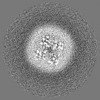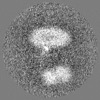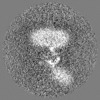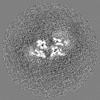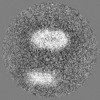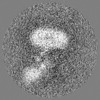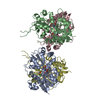[English] 日本語
 Yorodumi
Yorodumi- EMDB-44245: GluA2 flip Q in complex with TARPgamma2 at pH5, class23, structur... -
+ Open data
Open data
- Basic information
Basic information
| Entry |  | |||||||||||||||
|---|---|---|---|---|---|---|---|---|---|---|---|---|---|---|---|---|
| Title | GluA2 flip Q in complex with TARPgamma2 at pH5, class23, structure of LBD-TMD-TARPgamma2 | |||||||||||||||
 Map data Map data | GluA2 flip Q isoform in complex with TARPgamma2 at pH5.3, class23 structure of LBD-TMD-TARPgamma2 | |||||||||||||||
 Sample Sample |
| |||||||||||||||
 Keywords Keywords | AMPA receptor / ionotropic glutamate receptor / ion channel / auxiliary subunit / TRANSPORT PROTEIN | |||||||||||||||
| Function / homology |  Function and homology information Function and homology informationPresynaptic depolarization and calcium channel opening / regulation of postsynaptic neurotransmitter receptor activity / LGI-ADAM interactions / Trafficking of AMPA receptors / eye blink reflex / positive regulation of protein localization to basolateral plasma membrane / cerebellar mossy fiber / neurotransmitter receptor transport, postsynaptic endosome to lysosome / regulation of AMPA receptor activity / neurotransmitter receptor internalization ...Presynaptic depolarization and calcium channel opening / regulation of postsynaptic neurotransmitter receptor activity / LGI-ADAM interactions / Trafficking of AMPA receptors / eye blink reflex / positive regulation of protein localization to basolateral plasma membrane / cerebellar mossy fiber / neurotransmitter receptor transport, postsynaptic endosome to lysosome / regulation of AMPA receptor activity / neurotransmitter receptor internalization / membrane hyperpolarization / postsynaptic neurotransmitter receptor diffusion trapping / nervous system process / protein targeting to membrane / voltage-gated calcium channel complex / neurotransmitter receptor localization to postsynaptic specialization membrane / neuromuscular junction development / spine synapse / dendritic spine neck / dendritic spine head / Activation of AMPA receptors / perisynaptic space / AMPA glutamate receptor activity / transmission of nerve impulse / ligand-gated monoatomic cation channel activity / channel regulator activity / Trafficking of GluR2-containing AMPA receptors / response to lithium ion / immunoglobulin binding / regulation of postsynaptic membrane neurotransmitter receptor levels / AMPA glutamate receptor complex / membrane depolarization / kainate selective glutamate receptor activity / ionotropic glutamate receptor complex / extracellularly glutamate-gated ion channel activity / cellular response to glycine / asymmetric synapse / regulation of receptor recycling / Unblocking of NMDA receptors, glutamate binding and activation / voltage-gated calcium channel activity / positive regulation of synaptic transmission / glutamate receptor binding / extracellular ligand-gated monoatomic ion channel activity / glutamate-gated receptor activity / response to fungicide / glutamate-gated calcium ion channel activity / presynaptic active zone membrane / regulation of synaptic transmission, glutamatergic / somatodendritic compartment / dendrite membrane / cellular response to brain-derived neurotrophic factor stimulus / cytoskeletal protein binding / ligand-gated monoatomic ion channel activity involved in regulation of presynaptic membrane potential / ionotropic glutamate receptor binding / dendrite cytoplasm / ionotropic glutamate receptor signaling pathway / hippocampal mossy fiber to CA3 synapse / positive regulation of synaptic transmission, glutamatergic / regulation of membrane potential / SNARE binding / dendritic shaft / synaptic transmission, glutamatergic / synaptic membrane / PDZ domain binding / transmitter-gated monoatomic ion channel activity involved in regulation of postsynaptic membrane potential / protein tetramerization / postsynaptic density membrane / establishment of protein localization / modulation of chemical synaptic transmission / Schaffer collateral - CA1 synapse / terminal bouton / receptor internalization / cerebral cortex development / synaptic vesicle membrane / response to calcium ion / synaptic vesicle / presynapse / signaling receptor activity / presynaptic membrane / amyloid-beta binding / growth cone / scaffold protein binding / chemical synaptic transmission / perikaryon / postsynaptic membrane / dendritic spine / postsynaptic density / neuron projection / axon / neuronal cell body / glutamatergic synapse / dendrite / synapse / protein-containing complex binding / protein kinase binding / cell surface / endoplasmic reticulum / protein-containing complex / identical protein binding / membrane Similarity search - Function | |||||||||||||||
| Biological species |   | |||||||||||||||
| Method | single particle reconstruction / cryo EM / Resolution: 3.56 Å | |||||||||||||||
 Authors Authors | Nakagawa T / Greger IH | |||||||||||||||
| Funding support |  United States, United States,  United Kingdom, 4 items United Kingdom, 4 items
| |||||||||||||||
 Citation Citation |  Journal: Nat Struct Mol Biol / Year: 2024 Journal: Nat Struct Mol Biol / Year: 2024Title: Proton-triggered rearrangement of the AMPA receptor N-terminal domains impacts receptor kinetics and synaptic localization. Authors: Josip Ivica / Nejc Kejzar / Hinze Ho / Imogen Stockwell / Viktor Kuchtiak / Alexander M Scrutton / Terunaga Nakagawa / Ingo H Greger /    Abstract: AMPA glutamate receptors (AMPARs) are ion channel tetramers that mediate the majority of fast excitatory synaptic transmission. They are composed of four subunits (GluA1-GluA4); the GluA2 subunit ...AMPA glutamate receptors (AMPARs) are ion channel tetramers that mediate the majority of fast excitatory synaptic transmission. They are composed of four subunits (GluA1-GluA4); the GluA2 subunit dominates AMPAR function throughout the forebrain. Its extracellular N-terminal domain (NTD) determines receptor localization at the synapse, ensuring reliable synaptic transmission and plasticity. This synaptic anchoring function requires a compact NTD tier, stabilized by a GluA2-specific NTD interface. Here we show that low pH conditions, which accompany synaptic activity, rupture this interface. All-atom molecular dynamics simulations reveal that protonation of an interfacial histidine residue (H208) centrally contributes to NTD rearrangement. Moreover, in stark contrast to their canonical compact arrangement at neutral pH, GluA2 cryo-electron microscopy structures exhibit a wide spectrum of NTD conformations under acidic conditions. We show that the consequences of this pH-dependent conformational control are twofold: rupture of the NTD tier slows recovery from desensitized states and increases receptor mobility at mouse hippocampal synapses. Therefore, a proton-triggered NTD switch will shape both AMPAR location and kinetics, thereby impacting synaptic signal transmission. | |||||||||||||||
| History |
|
- Structure visualization
Structure visualization
| Supplemental images |
|---|
- Downloads & links
Downloads & links
-EMDB archive
| Map data |  emd_44245.map.gz emd_44245.map.gz | 166.5 MB |  EMDB map data format EMDB map data format | |
|---|---|---|---|---|
| Header (meta data) |  emd-44245-v30.xml emd-44245-v30.xml emd-44245.xml emd-44245.xml | 26.2 KB 26.2 KB | Display Display |  EMDB header EMDB header |
| FSC (resolution estimation) |  emd_44245_fsc.xml emd_44245_fsc.xml | 12.8 KB | Display |  FSC data file FSC data file |
| Images |  emd_44245.png emd_44245.png | 114.7 KB | ||
| Filedesc metadata |  emd-44245.cif.gz emd-44245.cif.gz | 7.2 KB | ||
| Others |  emd_44245_additional_1.map.gz emd_44245_additional_1.map.gz emd_44245_additional_2.map.gz emd_44245_additional_2.map.gz emd_44245_half_map_1.map.gz emd_44245_half_map_1.map.gz emd_44245_half_map_2.map.gz emd_44245_half_map_2.map.gz | 9.6 MB 140.3 MB 140.8 MB 140.6 MB | ||
| Archive directory |  http://ftp.pdbj.org/pub/emdb/structures/EMD-44245 http://ftp.pdbj.org/pub/emdb/structures/EMD-44245 ftp://ftp.pdbj.org/pub/emdb/structures/EMD-44245 ftp://ftp.pdbj.org/pub/emdb/structures/EMD-44245 | HTTPS FTP |
-Validation report
| Summary document |  emd_44245_validation.pdf.gz emd_44245_validation.pdf.gz | 1.1 MB | Display |  EMDB validaton report EMDB validaton report |
|---|---|---|---|---|
| Full document |  emd_44245_full_validation.pdf.gz emd_44245_full_validation.pdf.gz | 1.1 MB | Display | |
| Data in XML |  emd_44245_validation.xml.gz emd_44245_validation.xml.gz | 20.2 KB | Display | |
| Data in CIF |  emd_44245_validation.cif.gz emd_44245_validation.cif.gz | 26.8 KB | Display | |
| Arichive directory |  https://ftp.pdbj.org/pub/emdb/validation_reports/EMD-44245 https://ftp.pdbj.org/pub/emdb/validation_reports/EMD-44245 ftp://ftp.pdbj.org/pub/emdb/validation_reports/EMD-44245 ftp://ftp.pdbj.org/pub/emdb/validation_reports/EMD-44245 | HTTPS FTP |
-Related structure data
| Related structure data | 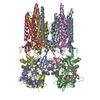 9b64MC 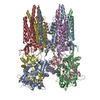 9b5zC  9b60C 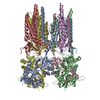 9b61C 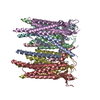 9b63C 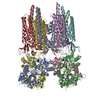 9b67C 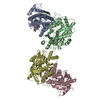 9b68C 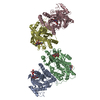 9b69C 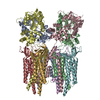 9b6aC C: citing same article ( M: atomic model generated by this map |
|---|---|
| Similar structure data | Similarity search - Function & homology  F&H Search F&H Search |
- Links
Links
| EMDB pages |  EMDB (EBI/PDBe) / EMDB (EBI/PDBe) /  EMDataResource EMDataResource |
|---|---|
| Related items in Molecule of the Month |
- Map
Map
| File |  Download / File: emd_44245.map.gz / Format: CCP4 / Size: 178 MB / Type: IMAGE STORED AS FLOATING POINT NUMBER (4 BYTES) Download / File: emd_44245.map.gz / Format: CCP4 / Size: 178 MB / Type: IMAGE STORED AS FLOATING POINT NUMBER (4 BYTES) | ||||||||||||||||||||||||||||||||||||
|---|---|---|---|---|---|---|---|---|---|---|---|---|---|---|---|---|---|---|---|---|---|---|---|---|---|---|---|---|---|---|---|---|---|---|---|---|---|
| Annotation | GluA2 flip Q isoform in complex with TARPgamma2 at pH5.3, class23 structure of LBD-TMD-TARPgamma2 | ||||||||||||||||||||||||||||||||||||
| Projections & slices | Image control
Images are generated by Spider. | ||||||||||||||||||||||||||||||||||||
| Voxel size | X=Y=Z: 0.82 Å | ||||||||||||||||||||||||||||||||||||
| Density |
| ||||||||||||||||||||||||||||||||||||
| Symmetry | Space group: 1 | ||||||||||||||||||||||||||||||||||||
| Details | EMDB XML:
|
-Supplemental data
-Additional map: Focused refinement of the NTDs
| File | emd_44245_additional_1.map | ||||||||||||
|---|---|---|---|---|---|---|---|---|---|---|---|---|---|
| Annotation | Focused refinement of the NTDs | ||||||||||||
| Projections & Slices |
| ||||||||||||
| Density Histograms |
-Additional map: Un-sharpenned map: GluA2 flip Q isoform in complex...
| File | emd_44245_additional_2.map | ||||||||||||
|---|---|---|---|---|---|---|---|---|---|---|---|---|---|
| Annotation | Un-sharpenned map: GluA2 flip Q isoform in complex with TARPgamma2 at pH5.3, class23 structure of LBD-TMD-TARPgamma2 | ||||||||||||
| Projections & Slices |
| ||||||||||||
| Density Histograms |
-Half map: Half1 map: GluA2 flip Q isoform in complex...
| File | emd_44245_half_map_1.map | ||||||||||||
|---|---|---|---|---|---|---|---|---|---|---|---|---|---|
| Annotation | Half1 map: GluA2 flip Q isoform in complex with TARPgamma2 at pH5.3, class23 structure of LBD-TMD-TARPgamma2 | ||||||||||||
| Projections & Slices |
| ||||||||||||
| Density Histograms |
-Half map: Half2 map: GluA2 flip Q isoform in complex...
| File | emd_44245_half_map_2.map | ||||||||||||
|---|---|---|---|---|---|---|---|---|---|---|---|---|---|
| Annotation | Half2 map: GluA2 flip Q isoform in complex with TARPgamma2 at pH5.3, class23 structure of LBD-TMD-TARPgamma2 | ||||||||||||
| Projections & Slices |
| ||||||||||||
| Density Histograms |
- Sample components
Sample components
-Entire : GluA2 (flip-Q isoform) in complex with TARPgamma2 at 4:4 stoichiometry
| Entire | Name: GluA2 (flip-Q isoform) in complex with TARPgamma2 at 4:4 stoichiometry |
|---|---|
| Components |
|
-Supramolecule #1: GluA2 (flip-Q isoform) in complex with TARPgamma2 at 4:4 stoichiometry
| Supramolecule | Name: GluA2 (flip-Q isoform) in complex with TARPgamma2 at 4:4 stoichiometry type: complex / ID: 1 / Parent: 0 / Macromolecule list: all |
|---|---|
| Molecular weight | Theoretical: 500 KDa |
-Macromolecule #1: Voltage-dependent calcium channel gamma-2 subunit
| Macromolecule | Name: Voltage-dependent calcium channel gamma-2 subunit / type: protein_or_peptide / ID: 1 / Number of copies: 4 / Enantiomer: LEVO |
|---|---|
| Source (natural) | Organism:  |
| Molecular weight | Theoretical: 35.938746 KDa |
| Recombinant expression | Organism:  Homo sapiens (human) Homo sapiens (human) |
| Sequence | String: MGLFDRGVQM LLTTVGAFAA FSLMTIAVGT DYWLYSRGVC KTKSVSENET SKKNEEVMTH SGLWRTCCLE GNFKGLCKQI DHFPEDADY EADTAEYFLR AVRASSIFPI LSVILLFMGG LCIAASEFYK TRHNIILSAG IFFVSAGLSN IIGIIVYISA N AGDPSKSD ...String: MGLFDRGVQM LLTTVGAFAA FSLMTIAVGT DYWLYSRGVC KTKSVSENET SKKNEEVMTH SGLWRTCCLE GNFKGLCKQI DHFPEDADY EADTAEYFLR AVRASSIFPI LSVILLFMGG LCIAASEFYK TRHNIILSAG IFFVSAGLSN IIGIIVYISA N AGDPSKSD SKKNSYSYGW SFYFGALSFI IAEMVGVLAV HMFIDRHKQL RATARATDYL QASAITRIPS YRYRYQRRSR SS SRSTEPS HSRDASPVGV KGFNTLPSTE ISMYTLSRDP LKAATTPTAT YNSDRDNSFL QVHNCIQKDS KDSLHANTAN RRT TPV UniProtKB: Voltage-dependent calcium channel gamma-2 subunit |
-Macromolecule #2: Isoform Flip of Glutamate receptor 2
| Macromolecule | Name: Isoform Flip of Glutamate receptor 2 / type: protein_or_peptide / ID: 2 / Details: A FLAG epitope tag is inserted near the C-terminus / Number of copies: 4 / Enantiomer: LEVO |
|---|---|
| Source (natural) | Organism:  |
| Molecular weight | Theoretical: 99.617492 KDa |
| Recombinant expression | Organism:  Homo sapiens (human) Homo sapiens (human) |
| Sequence | String: MQKIMHISVL LSPVLWGLIF GVSSNSIQIG GLFPRGADQE YSAFRVGMVQ FSTSEFRLTP HIDNLEVANS FAVTNAFCSQ FSRGVYAIF GFYDKKSVNT ITSFCGTLHV SFITPSFPTD GTHPFVIQMR PDLKGALLSL IEYYQWDKFA YLYDSDRGLS T LQAVLDSA ...String: MQKIMHISVL LSPVLWGLIF GVSSNSIQIG GLFPRGADQE YSAFRVGMVQ FSTSEFRLTP HIDNLEVANS FAVTNAFCSQ FSRGVYAIF GFYDKKSVNT ITSFCGTLHV SFITPSFPTD GTHPFVIQMR PDLKGALLSL IEYYQWDKFA YLYDSDRGLS T LQAVLDSA AEKKWQVTAI NVGNINNDKK DETYRSLFQD LELKKERRVI LDCERDKVND IVDQVITIGK HVKGYHYIIA NL GFTDGDL LKIQFGGANV SGFQIVDYDD SLVSKFIERW STLEEKEYPG AHTATIKYTS ALTYDAVQVM TEAFRNLRKQ RIE ISRRGN AGDCLANPAV PWGQGVEIER ALKQVQVEGL SGNIKFDQNG KRINYTINIM ELKTNGPRKI GYWSEVDKMV VTLT ELPSG NDTSGLENKT VVVTTILESP YVMMKKNHEM LEGNERYEGY CVDLAAEIAK HCGFKYKLTI VGDGKYGARD ADTKI WNGM VGELVYGKAD IAIAPLTITL VREEVIDFSK PFMSLGISIM IKKPQKSKPG VFSFLDPLAY EIWMCIVFAY IGVSVV LFL VSRFSPYEWH TEEFEDGRET QSSESTNEFG IFNSLWFSLG AFMQQGCDIS PRSLSGRIVG GVWWFFTLII ISSYTAN LA AFLTVERMVS PIESAEDLSK QTEIAYGTLD SGSTKEFFRR SKIAVFDKMW TYMRSAEPSV FVRTTAEGVA RVRKSKGK Y AYLLESTMNE YIEQRKPCDT MKVGGNLDSK GYDIATPKGS SLGTPVNLAV LKLSEQGVLD KLKNKWWYDK GECGAKDSG SKEKTSALSL SNVAGVFYIL VGGLGLAMLV ALIEFCYKSR AEAKRMKVAK NPQNINPSSS QNSQNFATDY KDDDDKEGYN VYGIESVKI UniProtKB: Glutamate receptor 2 |
-Experimental details
-Structure determination
| Method | cryo EM |
|---|---|
 Processing Processing | single particle reconstruction |
| Aggregation state | particle |
- Sample preparation
Sample preparation
| Concentration | 10 mg/mL | ||||||||||||
|---|---|---|---|---|---|---|---|---|---|---|---|---|---|
| Buffer | pH: 8 Component:
Details: Tris adjusted to pH 8 using HCl. 4 micro litter of protein in buffer was mixed with 1 micro litter of 50mM citric acid buffer (the 50mM citric acid buffer was prepared by diluting 0.5M ...Details: Tris adjusted to pH 8 using HCl. 4 micro litter of protein in buffer was mixed with 1 micro litter of 50mM citric acid buffer (the 50mM citric acid buffer was prepared by diluting 0.5M citric acid/sodium citrate buffer at pH4.0) immediately before applying the sample to the grid. | ||||||||||||
| Grid | Model: UltrAuFoil R1.2/1.3 / Material: GOLD / Mesh: 300 / Support film - Material: CARBON / Support film - topology: HOLEY ARRAY / Pretreatment - Type: GLOW DISCHARGE / Pretreatment - Time: 120 sec. | ||||||||||||
| Vitrification | Cryogen name: ETHANE / Chamber humidity: 100 % / Chamber temperature: 277.15 K / Instrument: FEI VITROBOT MARK IV |
- Electron microscopy
Electron microscopy
| Microscope | TFS KRIOS |
|---|---|
| Image recording | Film or detector model: GATAN K3 BIOQUANTUM (6k x 4k) / Number grids imaged: 1 / Number real images: 19684 / Average electron dose: 55.6 e/Å2 |
| Electron beam | Acceleration voltage: 300 kV / Electron source:  FIELD EMISSION GUN FIELD EMISSION GUN |
| Electron optics | Illumination mode: FLOOD BEAM / Imaging mode: BRIGHT FIELD / Nominal defocus max: 2.4 µm / Nominal defocus min: 1.0 µm |
| Sample stage | Cooling holder cryogen: NITROGEN |
| Experimental equipment |  Model: Titan Krios / Image courtesy: FEI Company |
 Movie
Movie Controller
Controller


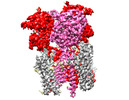








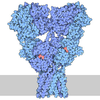

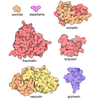


 Z (Sec.)
Z (Sec.) Y (Row.)
Y (Row.) X (Col.)
X (Col.)







